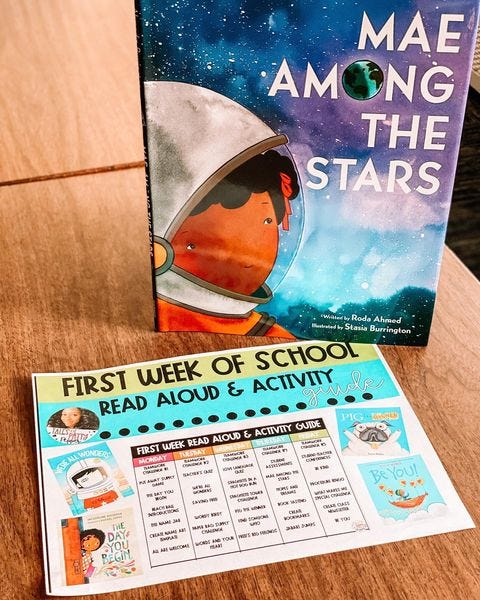The New School Year
Starting off on the right foot
In most parts of the world, teachers are preparing to return to the classroom. Some of us will be masked, and many required to be vaccinated. So it will be different in some ways, but in most other ways, it will be the same level of anticipation, and require the same level of preparation it always has.
I follow several grade school teachers on Instagram. I do that because I learn from them, even though I teach in a University graduate school. I learn all sorts of things from them, but at this time of year, I find myself in awe of their classroom preparation. The bulletin boards and lesson plans they are building are epic.
And they are pedagogically sound too - it’s not all primary colors and numbers for the sake of it. They have clearly thought through every inch of what they are preparing to present to their students on Day 1. For third graders. I find myself grateful for their dedication. Students learn a lot more in third grade than we think they do, and - at the best - they do so with teachers who are skilled with working with young minds, and dedicated to their jobs. The ones I see on Instagram quite obviously love what they do. (Search #teachersofinstagram for many more examples).
I feel the same sort of anticipation. I have printed out my new students names and photographs, and I will do my best to memorize them before the first day of class. I will meet some of them at a lunch next Tuesday. I am reminded that what we are doing is starting a relationship, albeit one focused (fully) on that of the teacher-student. But it is a relationship, and for the class at a whole, an act of community building that starts at the lunch next week. Students watch us very closely, whether we are teaching them as third graders or grad students who have seen it all already.
I had a Dean once who called me a perfectionist. He wasn’t wrong, but it came across as an indictment. So I have thought about that comment for the many intervening years since he said it. I’m willing to admit most of it. But I still think it is, fundamentally, wrong. Because I believe a teacher should strive to be a perfectionist, always. To think through what they are doing every minute of class time, of every assignment, of every comment they write on a student’s paper. We often can not tell what that one thing we might say or write that comes across the wrong way to a student. And we often can’t tell what that one thing we might say to a student that connects the two dots they are missing the connection between.

So I find myself this week not just tweaking a syllabus I have taught from for nearly a quarter century, but spending the time to reshape it into an entirely different form. I have changed my assessment workflow, which was, frankly, outdated. And there is more I will write about in future letters to you.
I suppose I am a perfectionist. But I am also acutely aware that I am not perfect. The difference, I think, is that I still have a deep desire to get better every year. Probably a hopeless goal. I should just coast on all that I know about teaching this course. But I believe that when the desire to improve disappears for me, I will know it is time to quit.
Letters of Recommendation
The month off from writing this newsletter was intense, with a family funeral, a new car, a burst pipe in the basement, and sending my kids off to different cities to attend college and grad school. Not exactly a vacay on the beach. But one of the things I wanted to accomplish while away from this newsletter was an environmental audit. That sounds fancy, but it is the name I gave to an effort - by no means comprehensive yet - to look more closely at the environmental impact of my home. Do I need print magazines anymore? How can we use less plastic? How much would solar panels cost? In connection with that examination, I read and can recommend a book entitled Say Goodbye to Plastic, by Sandra Ann Harris, founder of Eco Lunch Boxes.
Q of the Week
The Q of the Week this week is a Quote, from Scott McLeod, a professor of Educational Leadership at the University of Colorado at Denver. He blogs at dangerously ! irrelevant. Scott might also be a “perfectionist,” but see what you think:
My responsibility as a teacher is to create a learning environment that facilitates learning for every student. My ultimate goal is to make each class the best learning experience my students have ever had.




Perfectionism is a conundrum. Because, yes, as you said, we teachers should strive for perfection, but...the trouble with striving for perfection is that it often precludes adaptability and responsiveness. In other words, sometimes trying to get some perfect stops you from getting it right. And what I mean is that, like every teacher, I spend a lot of time before the semester planning my lessons. I revise them and try to make them as "perfect" as I can. And then the actual lesson time hits and the plan gets chucked out the window in favor of in-the-moment student needs.
I don't think this is news to any teacher.
But I think it's important to remember because perfectionism only works within strict limits: I'm going to make my syllabus as up-to-date and relevant as possible = good. I'm going to teach this syllabus that I have perfected regardless of whether my students respond to it = bad.
As always, interesting post. Glad to see you back and hope you had a good summer!